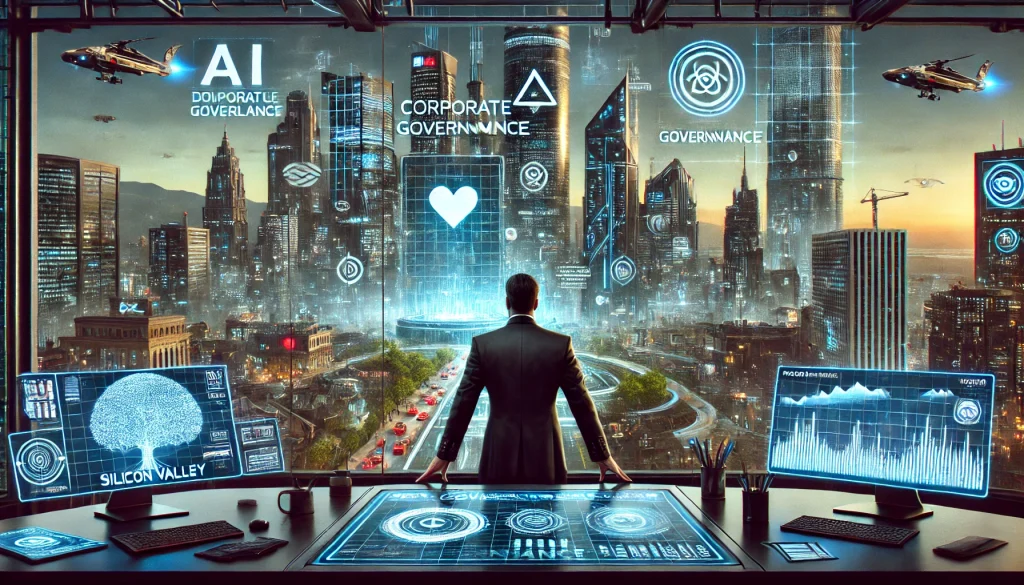
The intellectual evolution of Peter Thiel represents one of the most significant shifts in Silicon Valley political thought over the past two decades. From his early days as a champion of libertarian ideals to his current position as a leading advocate of neoreactionary politics, Thiel’s journey illuminates broader changes in how tech industry leaders think about governance, human development, and the future of society.
The Libertarian Foundation
Peter Thiel’s political journey begins with libertarianism. As a Stanford student and young entrepreneur, he embraced classical libertarian ideals of individual freedom and minimal government intervention. His early writing and speeches emphasized personal liberty, free markets, and technological innovation as paths to human progress. This period culminated in his co-founding of PayPal, which he initially envisioned as a tool for creating a new currency outside government control1.
However, Thiel’s version of libertarianism always contained elements that distinguished it from mainstream libertarian thought. While most libertarians focused on individual rights and market freedom, Thiel emphasized the role of technological innovation and elite capability in driving human progress. His early writings suggest he viewed libertarianism less as a philosophical end in itself and more as a means to enable technological advancement and human enhancement.
The Democratic Disillusionment
The turning point in Thiel’s political thought came in the late 2000s, crystallizing in his influential 2009 essay “The Education of a Libertarian.” In this piece, Thiel explicitly declares that freedom and democracy are incompatible, marking a decisive break with traditional libertarian thought. This wasn’t merely a tactical shift but a fundamental reconceptualization of political possibilities2.
Thiel’s disillusionment with democracy stems from several sources. First, his experience in the tech industry led him to view democratic processes as impediments to innovation and progress. The regulatory challenges faced by companies like PayPal convinced him that democratic oversight was fundamentally at odds with technological advancement.
Second, his reading of Curtis Yarvin and other neoreactionary thinkers provided an intellectual framework for understanding why democracy might be inherently hostile to freedom as he conceived it. Yarvin’s concept of “the Cathedral” particularly resonated with Thiel’s experience of institutional resistance to technological change3.
Practical Applications: From Theory to Action
Thiel’s evolving political philosophy manifested in several significant initiatives and investments. Perhaps the most notable was his support for the Seasteading Institute, which aimed to create autonomous floating cities free from traditional government control. While often dismissed as a libertarian fantasy, seasteading represented something more significant in Thiel’s political evolution – an attempt to create spaces for experimenting with non-democratic governance models4.
Even more significant was Thiel’s founding of Palantir Technologies. Named after the all-seeing stones from Lord of the Rings, Palantir provides data analytics services to government agencies and corporations. While publicly positioned as a tool for enhancing security and efficiency, Palantir’s technology enables unprecedented levels of surveillance and social control. Its contracts with agencies like ICE demonstrate how Thiel’s theoretical rejection of democracy has translated into practical tools for authoritarian governance5.
The Transhumanist Turn
Integral to understanding Thiel’s political evolution is his deep engagement with transhumanist ideas. His investments in life extension research and human enhancement technologies reflect a vision of human development driven by technological intervention rather than democratic deliberation. Companies like Ambrosia, which explored young blood transfusion as a means of life extension, represent this fusion of technological utopianism with anti-democratic politics6.
Thiel’s transhumanism differs from earlier versions in its explicit rejection of democratic or egalitarian principles. While many transhumanists envision enhancement technologies becoming universally available, Thiel’s vision appears to accept or even embrace the possibility of a technologically enhanced elite emerging separate from the general population.
This connects to broader critiques of Thiel’s approach as essentially eugenic in nature. His emphasis on funding young entrepreneurs who skip college, combined with his interest in genetic enhancement and life extension, suggests a vision of human improvement through selection and enhancement rather than universal advancement7.
Networks of Influence
Thiel’s impact extends far beyond his personal philosophical evolution through his extensive network of investments and associations. His Founders Fund has backed numerous companies and projects aligned with neoreactionary thought, while his political donations have supported candidates who share his skepticism of democratic governance.
Particularly significant are Thiel’s connections to controversial figures and movements. His associations with alt-right writers and neoreactionary thinkers suggest a comfort with explicitly anti-democratic and exclusionary ideologies. While Thiel himself carefully avoids endorsing the more extreme aspects of these movements, his willingness to fund and platform their advocates has helped mainstream their ideas8.
The Political Machine
Perhaps most consequentially, Thiel has built what amounts to a political machine for advancing anti-democratic ideas. His funding of candidates like JD Vance and Blake Masters represents an attempt to translate neoreactionary theory into practical political power. These candidates combine superficial populist appeals with deep commitments to dismantling democratic institutions9.
This political project extends beyond individual candidates to include think tanks, media outlets, and academic initiatives. Thiel’s funding network has helped create an intellectual ecosystem where anti-democratic ideas can be developed, refined, and mainstreamed. This represents a sophisticated long-term strategy for shifting political discourse and institutions away from democratic norms.
The Technological Infrastructure
Underlying Thiel’s political projects is his development of technological infrastructure that could enable non-democratic governance. Palantir’s surveillance capabilities, combined with other data analytics and control technologies, create the potential for unprecedented social control. This technological dimension distinguishes Thiel’s anti-democratic project from earlier authoritarian movements10.
The combination of sophisticated surveillance technology with artificial intelligence and data analytics creates possibilities for social control that previous authoritarian movements could only dream about. Thiel’s companies are actively developing and deploying these capabilities, often through government contracts that effectively subsidize the development of authoritarian infrastructure.
The Biotech Dimension
Thiel’s investments in biotechnology and life extension research add another dimension to his political project. These investments reflect a vision of human enhancement driven by market forces and technological capability rather than democratic deliberation or ethical constraints. The implications of this approach are profound, potentially creating biological distinctions between enhanced and unenhanced populations11.
The ethical implications of Thiel’s biotech investments become particularly concerning when considered alongside his political philosophy. If democratic oversight of technological development is viewed as an impediment to progress, what constraints remain on potentially dangerous or socially destructive enhancement technologies?
Cultural Influence
Beyond his direct political and technological initiatives, Thiel has exercised significant cultural influence through his writing, speaking, and funding of media projects. His critique of higher education, captured in the famous line “We wanted flying cars, instead we got 140 characters,” has helped shape broader skepticism of established institutions12.
This cultural influence extends to his promotion of alternative educational and career paths, particularly through the Thiel Fellowship program. While positioned as expanding opportunities for young entrepreneurs, these initiatives also serve to delegitimize traditional democratic institutions and promote a more hierarchical vision of social organization.
Theoretical Contradictions
Despite its sophistication, Thiel’s political philosophy contains significant contradictions. His critique of democracy often relies on arguments about inefficiency and technological stagnation, yet many of his proposed alternatives lack clear mechanisms for avoiding similar problems. His vision of corporate governance as a model for political organization ignores the ways in which corporate efficiency often depends on external democratic institutions13.
Moreover, his combination of libertarian rhetoric with support for authoritarian governance creates philosophical tensions that remain unresolved. The freedom he advocates seems increasingly defined not as individual liberty but as the freedom of elite actors to operate without democratic constraints.
The Question of Influence
Assessing Thiel’s influence requires distinguishing between his direct impact through funding and investment and his broader role in shifting political discourse. While not all of his specific projects have succeeded – seasteading being a notable example – his ideas have helped reshape how many tech industry leaders think about governance and social organization14.
This influence is particularly significant because it provides intellectual justification for anti-democratic impulses that have always existed in American life. Thiel’s sophisticated critique of democracy, combined with his practical investments in surveillance and control technologies, creates a framework for transitioning from democratic to authoritarian governance.
Looking Forward
As we look to the future, Thiel’s influence seems likely to grow rather than diminish. His combination of technological capability, financial resources, and intellectual framework provides a powerful template for anti-democratic movements. Understanding his evolution from libertarianism to neoreaction is crucial for anyone concerned about the future of democratic governance15.
The challenge he presents is not just political but conceptual. Thiel’s critique of democracy raises real issues about governance in an age of rapid technological change. The question is whether these challenges can be addressed while preserving democratic values, or whether his vision of technocratic authoritarianism will prevail.
Footnotes
- Thiel, Peter & Masters, Blake. “Zero to One: Notes on Startups, or How to Build the Future” (2014). ↩
- Thiel, Peter. “The Education of a Libertarian.” Cato Unbound (2009). ↩
- Yarvin’s influence on Thiel is documented in multiple sources, including internal communications revealed in the BuzzFeed Milo leaks. ↩
- Details of Thiel’s seasteading investments come from public records and interviews with Seasteading Institute founders. ↩
- Palantir’s government contracts and capabilities are documented in numerous investigative reports and public records. ↩
- Thiel’s investments in life extension and enhancement technologies are tracked through public investment records. ↩
- Critics’ analyses of the eugenic implications of Thiel’s approach appear in several academic papers and journalistic investigations. ↩
- Thiel’s connections to controversial figures are documented through financial records and public appearances. ↩
- Campaign finance records and public statements reveal Thiel’s political investment strategy. ↩
- Technical capabilities of Thiel-funded companies are documented in patent filings and product documentation. ↩
- Biotech investments are tracked through public records and company announcements. ↩
- Thiel’s cultural criticism appears in numerous speeches and writings over the past decade. ↩
- Academic analyses of contradictions in Thiel’s philosophy have appeared in several political theory journals. ↩
- Impact assessments come from both supportive and critical analyses of Thiel’s influence. ↩
- Forward-looking analyses draw on current trends and stated objectives of Thiel-funded initiatives. ↩




